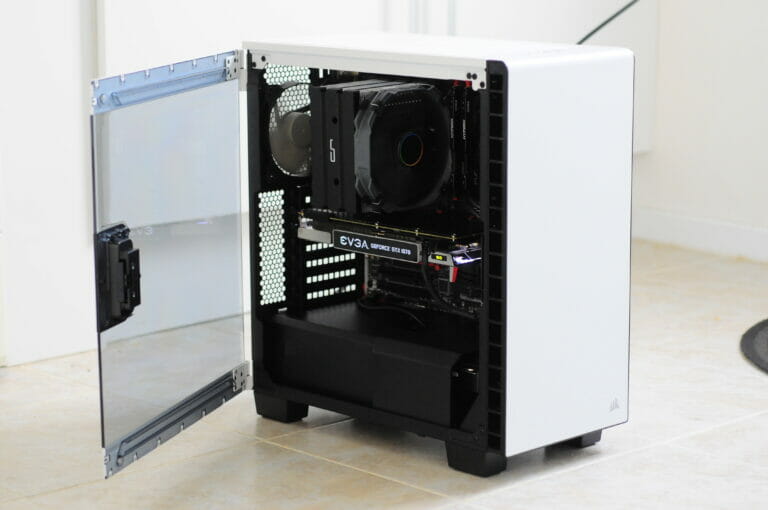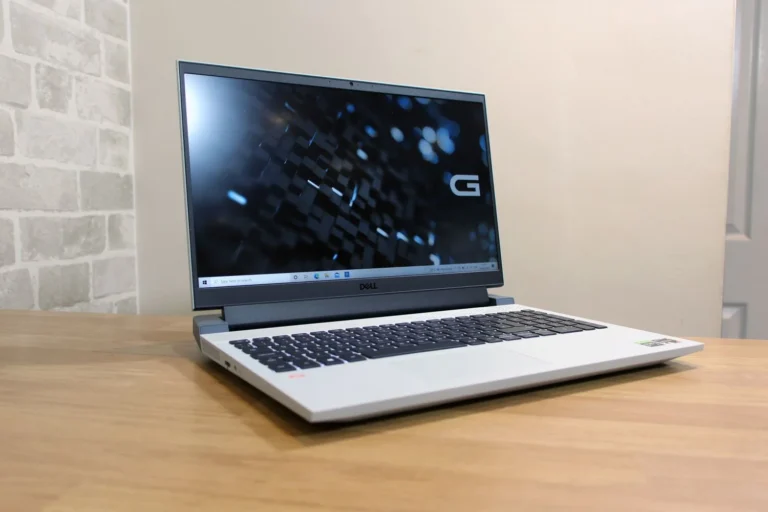
Introduction
When it comes to gaming laptops, one common concern among gamers is the noise level they produce. Gaming laptops are known for their powerful hardware and performance capabilities, but this often comes at the expense of increased fan noise. In this article, we will explore the question, “Are gaming laptops loud?” and delve into the factors that contribute to their noise levels. We will also provide some tips and recommendations to help you manage and reduce the noise generated by your gaming laptop.
Table of Contents
- Understanding Gaming Laptop Noise
- How Do Gaming Laptops Generate Noise?
- Why Are Gaming Laptops Louder Than Regular Laptops?
- Are Gaming Laptops Louder Than Desktop PCs?
- Factors Affecting Noise Levels in Gaming Laptops
- Cooling System and Fans
- Graphics Processing Unit (GPU)
- Central Processing Unit (CPU)
- Hard Disk Drive (HDD) vs. Solid-State Drive (SSD)
- Overclocking and Performance Settings
- Tips to Reduce Gaming Laptop Noise
- Clean and Maintain Your Laptop Regularly
- Adjust Power Settings
- Optimize In-Game Settings
- Use Headphones or External Speakers
- Invest in a Laptop Cooling Pad
- Frequently Asked Questions (FAQs)
- Why do gaming laptops have louder fans than regular laptops?
- Can I replace the fans in my gaming laptop to reduce noise?
- Are there any silent gaming laptops available in the market?
- Will using external cooling solutions help reduce gaming laptop noise?
- Can software optimizations help in reducing gaming laptop noise?
- Is there a trade-off between performance and noise in gaming laptops?
- Conclusion
Understanding Gaming Laptop Noise
How Do Gaming Laptops Generate Noise?
Gaming laptops generate noise primarily through their cooling systems. The powerful hardware components inside a gaming laptop generate a significant amount of heat when running demanding games or applications. To prevent overheating, gaming laptops employ cooling systems consisting of fans and heat sinks. The fans draw in cool air and expel hot air, effectively dissipating the heat generated by the internal components. The process of expelling hot air results in the audible noise produced by the fans.
Why Are Gaming Laptops Louder Than Regular Laptops?
Gaming laptops are louder than regular laptops because of their higher processing power and increased heat generation. The powerful GPUs and CPUs in gaming laptops require efficient cooling to operate optimally, resulting in the need for larger fans that can move more air. Additionally, gaming laptops often have multiple fans to provide better airflow and cooling performance. The combination of larger fans and multiple cooling components contributes to the overall noise level of gaming laptops.
Are Gaming Laptops Louder Than Desktop PCs?
Gaming laptops are generally louder than desktop PCs due to their compact form factor and limited space for cooling solutions. Desktop PCs can accommodate larger cooling fans, liquid cooling systems, and spacious heat sinks, allowing for better heat dissipation without the need for high fan speeds. On the other hand, gaming laptops have limited space, which necessitates the use of smaller fans that need to operate at higher speeds to achieve the same level of cooling. This results in increased noise levels compared to desktop PCs.
Factors Affecting Noise Levels in Gaming Laptops
Cooling System and Fans
The cooling system and fans play a crucial role in determining the noise levels of a gaming laptop. Higher-end gaming laptops often feature advanced cooling systems with multiple fans and heat pipes to effectively dissipate heat. However, more fans generally mean more noise. Additionally, the design and placement of the fans can affect noise levels. Some gaming laptops employ larger fans with optimized blade designs to reduce noise while maintaining efficient cooling.
Graphics Processing Unit (GPU)
The GPU is one of the primary components responsible for generating heat in gaming laptops. High-performance GPUs require robust cooling to prevent overheating and maintain optimal performance. As a result, gaming laptops equipped with powerful GPUs tend to have louder fans. Advanced cooling technologies such as vapor chambers or liquid cooling can help manage GPU temperatures more effectively, potentially reducing fan noise.
Central Processing Unit (CPU)
Similar to the GPU, the CPU in gaming laptops can also contribute to increased noise levels. Gaming laptops often feature high-performance processors that generate substantial heat under heavy workloads. Efficient cooling solutions, such as heat pipes and advanced thermal management techniques, are employed to keep the CPU temperatures in check. However, these cooling mechanisms can generate noise as they work to dissipate the heat.
Hard Disk Drive (HDD) vs. Solid-State Drive (SSD)
Traditional hard disk drives (HDDs) consist of moving mechanical parts that generate noise when in operation. On the other hand, solid-state drives (SSDs) have no moving parts, resulting in silent operation. Many modern gaming laptops come equipped with SSDs as the primary storage option, reducing the overall noise generated by the laptop.
Overclocking and Performance Settings
Overclocking refers to the process of pushing hardware components beyond their default specifications to achieve higher performance. While overclocking can enhance gaming performance, it also increases power consumption and heat generation, leading to louder fans. Adjusting the performance settings of your gaming laptop can help strike a balance between noise levels and desired performance. Choosing a preset power mode or manually adjusting clock speeds and fan profiles can help manage noise effectively.
Tips to Reduce Gaming Laptop Noise
Clean and Maintain Your Laptop Regularly
Accumulated dust and debris can hinder proper airflow and cause fans to work harder, resulting in increased noise. Regularly cleaning your gaming laptop, especially the cooling vents, and fans, can help maintain optimal airflow and reduce noise levels. Use compressed air or a soft brush to remove dust and ensure proper ventilation.
Adjust Power Settings
Most gaming laptops offer power management settings that allow you to control performance and power consumption. Experimenting with these settings can help reduce noise. Switching to power-saving modes or lowering the performance settings when engaging in less demanding tasks can minimize heat generation and subsequently lower fan noise.
Optimize In-Game Settings
Adjusting the graphics and performance settings within games can significantly impact both the temperature and noise levels of your gaming laptop. Lowering graphics quality, disabling resource-intensive features, or setting FPS limits can reduce the workload on the GPU and CPU, resulting in lower heat generation and quieter fan operation.
Use Headphones or External Speakers
Investing in a good pair of headphones or external speakers allows you to enjoy immersive gaming experiences without relying heavily on your laptop’s built-in speakers. By redirecting the audio output to external devices, you can mitigate the impact of fan noise and fully immerse yourself in the game.
Invest in a Laptop Cooling Pad
Laptop cooling pads are accessories designed to improve airflow and dissipate heat more efficiently. These pads often come with built-in fans that provide additional cooling support. By using a cooling pad, you can help reduce the workload on your laptop’s internal fans, potentially resulting in quieter operation.
Conclusion
In conclusion, gaming laptops tend to be louder than regular laptops due to their powerful hardware components and increased heat generation. Factors such as the cooling system, GPU and CPU performance, storage type, and overclocking can contribute to the overall noise levels. However, by implementing the tips and recommendations mentioned in this article, you can effectively manage and reduce the noise produced by your gaming laptop. Remember to clean and maintain your laptop regularly, adjust power and in-game settings, consider using external audio devices, and invest in cooling solutions if necessary. By striking a balance between performance and noise, you can enjoy immersive gaming experiences without being overly disturbed by fan noise.
Frequently Asked Questions (FAQs)
Why do gaming laptops have louder fans than regular laptops?
Gaming laptops have more powerful hardware components that generate significant heat. To prevent overheating and maintain performance, gaming laptops require robust cooling systems with larger fans and more aggressive fan profiles, leading to louder fan noise.
Can I replace the fans in my gaming laptop to reduce noise?
In some cases, it is possible to replace the fans in gaming laptops with quieter alternatives. However, this process can be challenging and may void your warranty. It is recommended to consult with the laptop manufacturer or a professional technician before attempting any modifications.
Are there any silent gaming laptops available in the market?
While it is challenging to find completely silent gaming laptops, certain models prioritize noise reduction by employing advanced cooling technologies, optimized fan profiles, and efficient thermal management systems. These laptops aim to strike a balance between performance and noise levels.
Will using external cooling solutions help reduce gaming laptop noise?
Yes, using external cooling solutions such as laptop cooling pads or laptop cooling stands can help reduce noise levels. These accessories provide additional airflow and cooling support, reducing the workload on the internal fans and potentially resulting in quieter operation.
Can software optimizations help in reducing gaming laptop noise?
Yes, software optimizations can help manage noise levels in gaming laptops. By adjusting power settings, optimizing in-game graphics, and limiting background processes, you can minimize heat generation and subsequently reduce fan noise.
Is there a trade-off between performance and noise in gaming laptops?
Yes, there is often a trade-off between performance and noise in gaming laptops. Higher performance settings and demanding tasks generate more heat, leading to increased fan speeds and noise. Finding the right balance between performance and acceptable noise levels is crucial for an optimal gaming experience.





